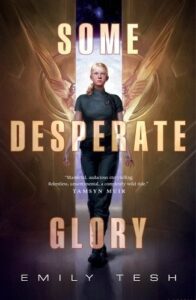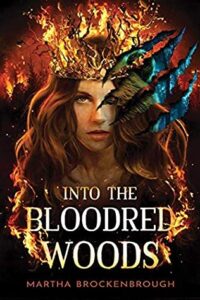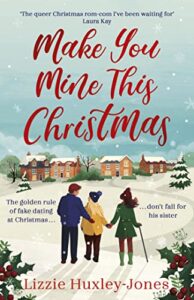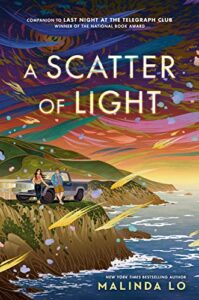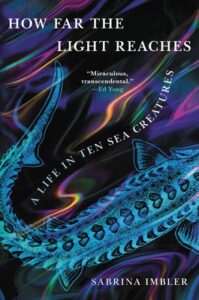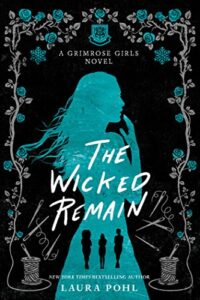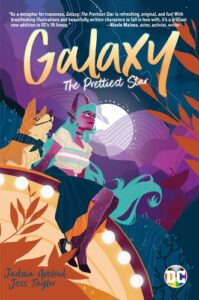Some Desperate Glory by Emily Tesh is one of the most powerful science fiction books I have ever read. I have not been able to read another book because I keep wondering where the main character Kyr has gone. I look for her in everything. She is such a well-rounded, complicated character (the best kind), and her story is going to stick with me for a long, long time.
The novel follows Kyr and her twin brother Magnus as they navigate the universe outside of the only home they have ever known. They are the best of the best when it comes to their training on Gaea Station, the last stronghold of humanity that stands against the alien threat that demolished the Earth before Kyr was even born. Being the best (of the girls) is what Kyr has worked for all her life. She has given everything to Gaea Station, and she has trained her mess of girls relentlessly, never settling for anything less than perfect. She is sure that this will pay off for all of them, most especially herself, but when the adult assignments come out, Kyr’s world gets shaken so substantially that she believes her only choice is to leave Gaea Station in an attempt to fix what the leader, a man she calls Uncle Jole, somehow got wrong. Leaving Gaea Station opens an entire world (literally) of possibilities for her, and Kyr unwittingly finds herself thrust into lives outside of Gaea Station that she never even knew were possible.
I read this book after a friend texted me updates as they read through the novel for the first time. Their reactions to the book convinced me to buy it when all I knew of it was that it contained time loops (my favorite plot dynamic). I do not regret picking this book up for a second. The amount of character development that Kyr undergoes over the course of this 400-page novel is extreme. She starts off the novel as a proud raised-fascist bent on getting Earth’s revenge, but she ends it as her own direct antithesis. I have not been able to put her story down. As a big The Locked Tomb fan and Baru Cormorant enjoyer, I expected a lot out of this book’s assessment of empire and the responsibility of its characters to claw their way out of the empire’s belly. Emily Tesh does not shy away from either of these things, and I was completely absorbed in the story she was trying to tell. Kyr is sucked in deep into Gaea Station’s propaganda and brutal view of the universe, but when she is faced with the truth of Gaea Station’s corruption, she pulls herself out of it and is already a different person before we even reach the middle of the novel. When I started my reread of the novel only two days after I had finished it the first time, the Kyr at the beginning felt like a completely different character than the Kyr who ends the novel. I experienced whiplash watching her beat up a character that she ends the novel in a close relationship with, and I loved it. It made me cry, seeing what she grows from. For a character to change so substantially, Emily Tesh has to have done something right. What other characters would go through over the course of a trilogy, Kyr goes through in one novel. Her story is contained in this one piece, and it keeps the reader engaged, watching every step that Kyr takes away from Gaea Station change her just a little bit more.
I have seen some criticism online of the “queer space opera” label Some Desperate Glory wears on its inside cover, but the ability of Kyr to radically accept her brother’s queerness and to eventually find her own queerness outside the borders of Gaea Station is a defining detail of the novel. Take away Kyr’s discovery of queerness within her bloodline, and you’re left with a book that takes place in space… and that’s it. The book does not progress without Magnus and Kyr both loudly proclaiming their queerness. On Gaea Station, Kyr only knows that she is the best of the girls; she doesn’t know if she experiences attraction because it is not important. Gaea Station has Nursery. They don’t need Kyr to know who she likes as long as they can force her to produce more boys to serve Gaea Station. It is an extreme act of rebellion for her to realize she is gay. Just because Kyr is not making out with every girl she sees or falling dramatically in love with every single one of her messmates at every turn does not mean the novel is not queer; it simply means that the novel’s focus on queerness is on the identity itself instead of on the acting out of that identity. Kyr’s story is not dependent on her exploring the bounds of her queerness because she isn’t far enough out of the hold Gaea Station has on her to do that. Kyr realizing that she is queer at all is what helps her figure out how awful Gaea Station has always been and makes the term “queer space opera” ring true.
If we’re using stars as a rating system, I give this book a complete 5 out of 5. While there are a few aspects of the world that I believe were hammered in too much (we get it, the shadow engines will smear somebody across fifteen dimensions, you don’t need to keep saying it every other chapter), I found myself able to look over them due to how well the book is written as a whole. The book begins with a list of trigger warnings, and it means them, so make sure to skip this novel if any of the triggers listed therein apply to you, such as: sexism, homophobia, child abuse, suicide, and more. This book is not shy about anything; everything listed in the warnings is handled front and center, in sometimes very graphic detail. Emily Tesh clearly cares about her characters and about the world that she writes them into, and Some Desperate Glory makes me want to read everything she has ever written just to get a taste of the way she crafts a story.

